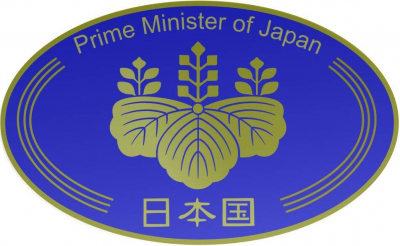Eisaku Sat ( , Sat Eisaku, 27 March 1901 3 June 1975) was a Japanese politician who served as Prime Minister from 1964 to 1972. He is the third-longest serving Prime Minister, and ranks second in longest uninterrupted service as Prime Minister.
Sat entered the National Diet in 1949 as a member of the Liberal Party. Gradually rising through the ranks of Japanese politics, he held a series of cabinet positions. In 1964 he succeeded Hayato Ikeda as Prime Minister, becoming the first Prime Minister to have been born in the 20th century.
As Prime Minister, Sat presided over a period of rapid economic growth. He arranged for the formal return of Okinawa (Ryukyu Islands; occupied by the United States since the end of the Second World War) to Japanese control. Sat brought Japan into the Nuclear Non-Proliferation Treaty, for which he received the Nobel Peace Prize as a co-recipient in 1974.
The prime minister of Japan (日本国内閣総理大臣, Nihon-koku naikaku sōridaijin, or shushō (首相)) (informally referred to as the PMOJ) is the head of the executive branch of the government of Japan. The prime minister directs the National Cabinet and is the commander-in-chief of the Japan Self-Defense Forces; he is appointed by the emperor of Japan after being designated by the National Diet and must enjoy the confidence of the House of Representatives to remain in office. He is the head of the Cabinet and appoints and dismisses the other ministers of state. The literal translation of the Japanese name for the office is Minister for the Comprehensive Administration of (or the Presidency over) the Cabinet.
The current prime minister of Japan is Fumio Kishida, who replaced Yoshihide Suga on 4 October 2021.

1965Aug, 19
Japanese prime minister Eisaku Satō becomes the first post-World War II sitting prime minister to visit Okinawa Prefecture.
Choose Another Date
Events on 1965
- 8Mar
Vietnam War
Thirty-five hundred United States Marines are the first American land combat forces committed during the Vietnam War. - 15Mar
Voting Rights Act
President Lyndon B. Johnson, responding to the Selma crisis, tells U.S. Congress "We shall overcome" while advocating the Voting Rights Act. - 6Aug
Voting Rights Act of 1965
US President Lyndon B. Johnson signs the Voting Rights Act of 1965 into law. - 27Nov
Lyndon B. Johnson
Vietnam War: The Pentagon tells U.S. President Lyndon B. Johnson that if planned operations are to succeed, the number of American troops in Vietnam has to be increased from 120,000 to 400,000. - 28Nov
Ferdinand Marcos
Vietnam War: In response to U.S. President Lyndon B. Johnson's call for "more flags" in Vietnam, Philippine President-elect Ferdinand Marcos announces he will send troops to help fight in South Vietnam.

 English
English  español
español  français
français  português
português  русский
русский  العربية
العربية  简体中文
简体中文 